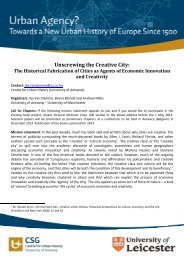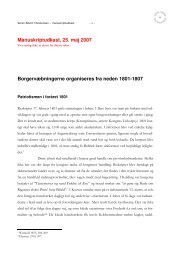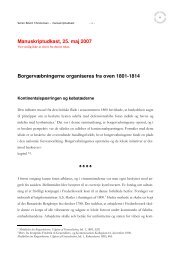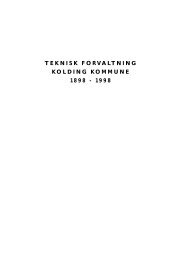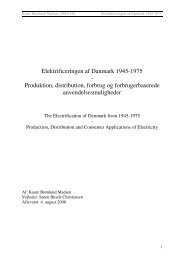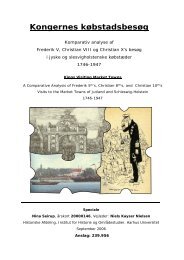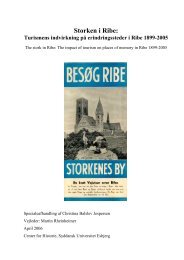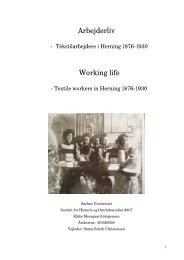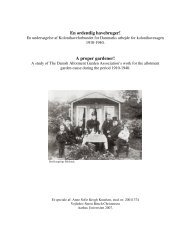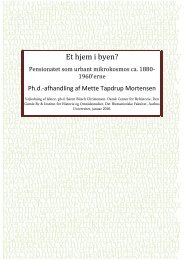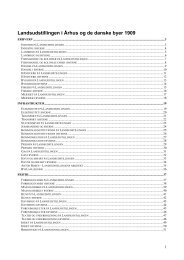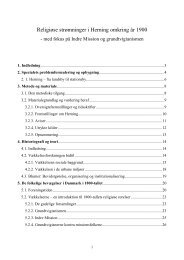- Page 1 and 2: Ud af røret? Planer, processer og
- Page 3 and 4: Indholdsfortegnelse: Forord........
- Page 5: Vedtagelsen af ‘Tout-à-l’égea
- Page 8 and 9: 8 8
- Page 10 and 11: Kloaksystemet er derfor ikke studer
- Page 12 and 13: kloaksystemerne, og afhandlingen vi
- Page 16 and 17: ecology has an increasing critique
- Page 18 and 19: plads, men mere som en dialektisk h
- Page 20 and 21: 20 * Det nuværende kloaksystem har
- Page 22 and 23: a) Dels at arbejde på ‘kloakproj
- Page 24 and 25: Et etnologisk bidrag Som skrevet ti
- Page 26 and 27: Kulturhistorikeren Troels-Lund (184
- Page 28 and 29: gihistorikere inden for de sidste 5
- Page 30 and 31: som i midten og slutningen af 1800-
- Page 32 and 33: Simon Wrisberg(1996)har med et jord
- Page 34 and 35: høj grad af specialiseret teoretis
- Page 36 and 37: 36 36
- Page 38 and 39: fundsvidenskabelige og humanistiske
- Page 40 and 41: En af de kontektualistiske teknolog
- Page 42 and 43: Videnskabsforskningen skal derfor f
- Page 44 and 45: logien formes gennem de selv samme
- Page 46 and 47: ske studier, og derfor vil jeg brug
- Page 48 and 49: Foucault sætter alt i relation til
- Page 50 and 51: spillet, og med et magtbegreb, der
- Page 52 and 53: for, hvad det er muligt at trække
- Page 54 and 55: 54 sit sandhedsregime, sin ‘almen
- Page 56 and 57: en sådan forståelse, har en tekno
- Page 58 and 59: Afhandlingen er et teknologistudie,
- Page 60 and 61: Med dette perspektiv er det tydelig
- Page 62 and 63: Det københavnske kloaksystems etap
- Page 64 and 65:
serne udenfor Amagerport, var førs
- Page 66 and 67:
gas og kloak) om en infrastruktur m
- Page 68 and 69:
Der er i 1840'erne og starten af 18
- Page 70 and 71:
egrænsninger for København, så b
- Page 72 and 73:
Frankenau er stærkt inspireret af
- Page 74 and 75:
74 med et tæt Laag, ophives, og bo
- Page 76 and 77:
nogle specifikke mål for bekæmpel
- Page 78 and 79:
‘ydre Orden’ fører til ‘indr
- Page 80 and 81:
80 hjælp, naar den lader sig opnaa
- Page 82 and 83:
Kabell henviser gang på gang til l
- Page 84 and 85:
Det er kendetegnende for Chadwick
- Page 86 and 87:
‘curere’ sygdomme men også at
- Page 88 and 89:
genieur’ til at udarbejde en saml
- Page 90 and 91:
Som det her fremgår, er der flere
- Page 92 and 93:
Den usikkerhed og den tvivl som kom
- Page 94 and 95:
94 “Det er derfor med Rette, at m
- Page 96 and 97:
Skeptikerne Men der var stadigvæk
- Page 98 and 99:
98 se.” 145 Således tilslutter h
- Page 100 and 101:
100 kostninger og derhos paadrage B
- Page 102 and 103:
102 et Cloaksystem som det tidliger
- Page 104 and 105:
den fulgte en dansk oversættelse a
- Page 106 and 107:
Det system, Colding skitserer, og h
- Page 108 and 109:
108 end den Control der skal føres
- Page 110 and 111:
Diskussioner foregår i statslig og
- Page 112 and 113:
112 res. Her maa han understøttes
- Page 114 and 115:
Forsamling i det Hele skal have nog
- Page 116 and 117:
Afdeling 3: - Sunde og billige boli
- Page 118 and 119:
vendes, hvor man tillige har et klo
- Page 120 and 121:
Directeur Norum, fængselsdirektør
- Page 122 and 123:
vandforsyning i lejlighederne mulig
- Page 124 and 125:
Genforhandlingerne af den fælles
- Page 126 and 127:
126 skylle saadanne Ledninger, der
- Page 128 and 129:
128 128
- Page 130 and 131:
klasser, som ‘hafta vilja och fö
- Page 132 and 133:
tetet dog først fik et særskilt n
- Page 134 and 135:
lingen med økonomisk tilskud. 200
- Page 136 and 137:
Som det tillige fremgår af Profess
- Page 138 and 139:
om at fremsætte til Congressens Be
- Page 140 and 141:
I England var flere ‘Philosophic
- Page 142 and 143:
forestillinger om dødens naturligh
- Page 144 and 145:
om et rationelt grundlag for livfor
- Page 146 and 147:
fremhæver Schleisner, ligesom Kabe
- Page 148 and 149:
148 “Den sörgelige Overvægt, so
- Page 150 and 151:
eskæftige sig med kulstoffets forb
- Page 152 and 153:
152 de som sygdomsstof, danner sig
- Page 154 and 155:
i-tale-sættes. Det er således nog
- Page 156 and 157:
sign, får indflydelse på de forel
- Page 158 and 159:
‘ejendomsret’ og ‘menneskeret
- Page 160 and 161:
tæft, og forstod ved hjælp af et
- Page 162 and 163:
Inden jeg tager fat på re-i-tale-s
- Page 164 and 165:
vand, rør og pumper bringes til Am
- Page 166 and 167:
166 “...Alle ere enige om, at (..
- Page 168 and 169:
ensede spildevandet ved ‘Intermit
- Page 170 and 171:
økonomisk Tab...” 274 Således a
- Page 172 and 173:
de forskellige kloakudløb i kanale
- Page 174 and 175:
174 ogsaa enhver betydeligere Ophob
- Page 176 and 177:
dom, og at det er her man skal sæt
- Page 178 and 179:
hjemmene hos folk. Han taler for, a
- Page 180 and 181:
Grundvold hvorpaa Hygieinene hviler
- Page 182 and 183:
I sit foredrag bruger Hornemann en
- Page 184 and 185:
184 “.. Selv om man, som hos os,
- Page 186 and 187:
udøve paa Nutidens videnskabelige
- Page 188 and 189:
opa. Dette må give os grund til ef
- Page 190 and 191:
190 “Hvorvidt dette System efter
- Page 192 and 193:
tor. 192 “Det er saaledes uheldig
- Page 194 and 195:
Kampen imod ‘sygelighed’ og ‘
- Page 196 and 197:
196 196
- Page 198 and 199:
værre ikke blev gennemført dengan
- Page 200 and 201:
en Koleraepidemi ved godt Drikkevan
- Page 202 and 203:
niøren’, ‘Ugeskrift for Læger
- Page 204 and 205:
204 den. At dette ikke er en hyggel
- Page 206 and 207:
nier, og Tallet af de Byer, hvor di
- Page 208 and 209:
208 ment, at det vilde være mest f
- Page 210 and 211:
210 “Af stor økonomisk Betydning
- Page 212 and 213:
ningen’ på natrenovationsproblem
- Page 214 and 215:
214 æsthetisk Henseende som et God
- Page 216 and 217:
216 lierne i ugevis ophobes i Bolig
- Page 218 and 219:
samlede latrinen i store beholdere,
- Page 220 and 221:
og som gik ud på at anlægge tre l
- Page 222 and 223:
222 Anerkendelse ethvert af de bedr
- Page 224 and 225:
“Latrinmassen vil her kunne forde
- Page 226 and 227:
den nuværende 100 kroners afgift.
- Page 228 and 229:
Han er derfor selv meget i tvivl om
- Page 230 and 231:
230 stem. Der have vist sig en bety
- Page 232 and 233:
232 Naturvidenskaber.” “...jo l
- Page 234 and 235:
23. 234 “Det Medicinske Selskab i
- Page 236 and 237:
. 236 “Med almindelig sund Sans v
- Page 238 and 239:
238 (..)Men skulde saadant blive F
- Page 240 and 241:
men argumenterne for den skifter ov
- Page 242 and 243:
del af latrinen, der ikke kunne sæ
- Page 244 and 245:
244 land, Norge og Sverige).” 442
- Page 246 and 247:
sporvogne. Der er fælles udflugt t
- Page 248 and 249:
fra 1886, som efter 16 år dog godt
- Page 250 and 251:
over hygiejniske og demografiske fo
- Page 252 and 253:
1858, er slet ikke tilstede, og i s
- Page 254 and 255:
254 254
- Page 256 and 257:
256 “Da jeg havde svømmet nogle
- Page 258 and 259:
1930'erne, kommer de mere konkrete
- Page 260 and 261:
260 ‘Formålet med undersøgelser
- Page 262 and 263:
Stadslæge Chroms idé om at løse
- Page 264 and 265:
I ‘Berlingske Tidende’, 16.Aug.
- Page 266 and 267:
Fra aktiv ‘Strøm’ til passiv
- Page 268 and 269:
ikerne i, at både universitetets n
- Page 270 and 271:
gavn for ‘recipienten’, ‘havm
- Page 272 and 273:
fyldt med døde hummere. Der blev s
- Page 274 and 275:
produktion af plastblødgører og f
- Page 276 and 277:
Næringsstoffer på afveje Som det
- Page 278 and 279:
geren ‘den samme komfort som almi
- Page 280 and 281:
tere de tekniske problemer, men at
- Page 282 and 283:
og ‘lokalt’ forvaltede systemer
- Page 284 and 285:
284 “At samle aktører fra forske
- Page 286 and 287:
Arrangørerne havde således bevids
- Page 288 and 289:
og havneområde. Ved at renovere og
- Page 290 and 291:
Kampen imod ‘Tout-à-l’égout
- Page 292 and 293:
‘kloakprojektet’ og Wrisberg (1
- Page 294 and 295:
levet beskrevet gennem konferencer,
- Page 296 and 297:
skussionerne, og det, der anses som
- Page 298 and 299:
Udgangspunktet har været et ‘ind
- Page 300 and 301:
Perspektiver Men hvordan ser fremti
- Page 302 and 303:
302 302
- Page 304 and 305:
ies in the Socio-technical Change
- Page 306 and 307:
1964-71. Den Combinerede Comitee,(1
- Page 308 and 309:
Foucault, M.(1999)‘Ordene og Ting
- Page 310 and 311:
Hoff. E.M(1894), ‘Kjøbenhavns Re
- Page 312 and 313:
Scientific Facts’. London/Beverly
- Page 314 and 315:
Rosen, G,(1974), ‘From Medical Po
- Page 316:
le. København. Opslagsbøger og un



